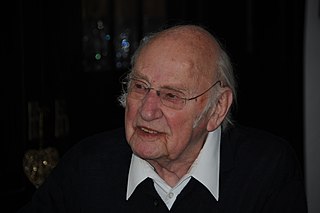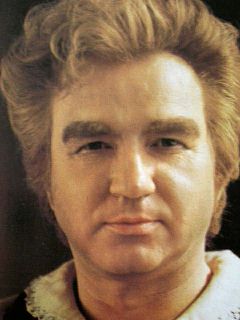Related Research Articles

The Bayreuth Festival is a music festival held annually in Bayreuth, Germany, at which performances of stage works by the 19th-century German composer Richard Wagner are presented. Wagner himself conceived and promoted the idea of a special festival to showcase his own works, in particular his monumental cycle Der Ring des Nibelungen and Parsifal.

Dietrich Fischer-Dieskau was a German lyric baritone and conductor of classical music. One of the most famous Lieder performers of the post-war period, he is best known as a singer of Franz Schubert's Lieder, particularly "Winterreise" of which his recordings with accompanists Gerald Moore and Jörg Demus are still critically acclaimed half a century after their release.

Wolfgang Wagner was a German opera director. He is best known as the director (Festspielleiter) of the Bayreuth Festival, a position he initially assumed alongside his brother Wieland in 1951 until the latter's death in 1966. From then on, he assumed total control until he retired in 2008, although many of the productions which he commissioned were severely criticized in their day. He had been plagued by family conflicts and criticism for many years. He was the son of Siegfried Wagner and he was the great-grandson of Franz Liszt.
Harry Alfred Robert Kupfer was a German opera director and academic. A long-time director at the Komische Oper Berlin, he worked at major opera houses and at festivals internationally. Trained by Walter Felsenstein, he worked in the tradition of realistic directing. At the Bayreuth Festival, he staged Wagner's Der fliegende Holländer in 1978 and Der Ring des Nibelungen in 1988. At the Salzburg Festival, he directed the premiere of Penderecki's Die schwarze Maske in 1986 and Der Rosenkavalier by Richard Strauss in 2014.

Christian Thielemann is a German conductor. He is currently chief conductor of the Staatskapelle Dresden, and the designated Generalmusikdirektor of the Berlin State Opera.

Hans Neuenfels was a German writer, poet, film producer, librettist, theatre director, opera director and theatre manager. As a director, he first focused on drama, staged at prominent houses such as the Vienna Burgtheater, and became a leading exponent of German Regietheater. From 1974, he turned to opera, looking for "the subliminal of the music and the interlinear of the texts", for "surprisingly new, sometimes even disturbingly ambivalent perspectives on the works".

Franz Mazura was an Austrian bass-baritone opera singer and actor. He performed at the Bayreuth Festival from 1971 for 25 years and at the Metropolitan Opera for 15 years. He was made a Kammersänger in 1980 and an Honorary Member of the Nationaltheater Mannheim in 1990. He most often played villains and strange characters, with signature roles including Klingsor in Wagner's Parsifal. Mazura took part in world premieres, such as the double role of Dr. Schön and Jack the Ripper in the world premiere of the completed version of Alban Berg's Lulu at the Paris Opera in 1979, and as Abraham in Giorgio Battistelli's Lot in 2017. Two of his recordings received Grammy Awards. His voice was described as with dark timbre, powerful and like granite, with perfect diction. His acting ability was described as "well-supplied with vivid imaginative touches, whether deployed in comic roles or characters of inexorable malevolence. Mazura could achieve more impact with a lifted eyebrow or a belligerently thrust chin than many artists could with a ten-minute monologue." He had a long career, appearing at the Staatsoper Berlin the night before his 95th birthday.
Hanna Schwarz is a German mezzo-soprano and contralto singer in opera and concert. In 1976 she performed the roles of Fricka and Erda in the centenary Jahrhundertring production at the Bayreuth Festival, directed by Patrice Chéreau.

Ortrun Wenkel is a German operatic contralto. She notably portrayed the role of Erda in the Bayreuth Jahrhundertring in 1976 and was awarded a Grammy Award as a Principal Soloist in 1983.

Reiner Goldberg was a German operatic heldentenor who made an international career performing and recording. He appeared at the Berlin State Opera from 1972, and was a member of the ensemble from 1981. Goldberg achieved attention when he sang the role of Wagner's Parsifal for a 1982 opera film directed by Hans-Jürgen Syberberg. He then became known for performing the tenor roles of Wagner's stage works in leading opera houses in Europe and worldwide, such as the Bayreuth Festival where he appeared from 1986 as Tannhäuser, Stolzing in Die Meistersinger von Nürnberg, Siegfried in both Siegfried and Götterdämmerung, and Erik in Der fliegende Holländer. He performed at the Metropolitan Opera as Siegfried, conducted by James Levine and alongside Hildegard Behrens as Brünnhilde, resulting in a recording that won a Grammy Award.

Parsifal is a 1982 West German-French opera film directed by Hans-Jürgen Syberberg, based on the opera of the same name by Richard Wagner. It was shown out of competition at the 1982 Cannes Film Festival.
Ekkehard Wlaschiha was a German operatic baritone who specialized in Wagnerian "villains", such as Alberich, Klingsor and Friedrich von Telramund. He performed at the Bayreuth Festival and at the Metropolitan Opera, and left many recordings.
Nadine Secunde is an American operatic soprano. She studied and performed in Germany, singing at the Bayreuth Festival the leading role of Elsa in Lohengrin and Sieglinde in Die Walküre, and made an international career. A specialist for the works of Wagner and Richard Strauss, she has also performed contemporary operas such as the title role of Judith by Siegfried Matthus at the Seattle Opera in the work's U.S. premiere.

Gwendolyn Killebrew was an American operatic contralto and mezzo-soprano who worked in Germany and internationally, including the Metropolitan Opera and the Bayreuth Festival. She performed in the 1971 world premiere of Ginastera's Beatrix Cenci for the opening of the new opera house of Kennedy Center in Washington, D.C. She was a member of the Deutsche Oper am Rhein from 1976 to 2006, where she took part in the world premiere of Klebe's Gervaise Macquart, and performed in other contemporary operas. After retirement, she worked as a music educator, giving master classes and teaching privately.
Christof Loy is a German stage director especially for opera, whose work received several awards. A freelance director, he has staged operas from Baroque to premieres of new works at major European opera houses and festivals. He is known for directing works by Mozart.

Der Ring in Minden was a project to stage Richard Wagner's cycle Der Ring des Nibelungen at the Stadttheater Minden, beginning in 2015 with Das Rheingold, followed by the other parts in the succeeding years, and culminating with the complete cycle performed twice in 2019. The stage director was Gerd Heinz, and Frank Beermann conducted the Nordwestdeutsche Philharmonie, playing on the stage of the small theatre. The singers acted in front of the orchestra, making an intimate approach to the dramatic situations possible. The project received international recognition and was compared favourably to the Bayreuth Festival.
Waltraud Isoldé Elchlepp is a German protest song singer under the pseudonym Dominique, and an operatic mezzo-soprano and soprano who appeared at major German opera houses and festivals including the Bayreuth Festival. She took part in world premieres such as Reimann's Das Schloß and Bernarda Albas Haus at the Bavarian State Opera. Besides the standard repertoire, she appeared in roles such as Othmar Schoeck's Penthesilea at the Staatsoper Hannover.
Frank Philipp Schlößmann is a German scenic designer focused on operas who has worked at major opera houses and festivals internationally. He staged Janáček's Jenůfa at the Metropolitan Opera, Wagner's Der Ring des Nibelungen at both the Bayreuth Festival and Der Ring in Minden, and the world premiere of Heinz Holliger's Lunea at the Opernhaus Zürich.
Erich Witte was a German stage actor, operatic tenor and opera director. He was based for almost five decades at the Berlin State Opera, and performed leading roles at major opera houses in Europe and at the Metropolitan opera. He participated in world premieres, including Louise Talma's Die Alkestiade and Alan Bush's Joe Hill.
Hilde Scheppan was a German operatic soprano and academic teacher. She was engaged for 20 years at the Staatsoper Unter den Linden in Berlin and made guest appearances at the Bayreuth Festival from 1937 to 1958. She performed roles in Wagner's stage works in productions by Heinz Tietjen both in Berlin and Bayreuth. After World War II, she first continued work in Berlin, but then moved to the Staatsoper Stuttgart. She taught as a professor of voice at the Hochschule für Musik Nürnberg and the Musikhochschule München.
References
- ↑ Kinemathek, Deutsche. "Die Verwandlung der Welt in Musik – Bayreuth vor der Premiere | Deutsche Kinemathek". www.deutsche-kinemathek.de (in German). Retrieved 2023-05-14.
- ↑ "The Transformation of the World Into Music". natlib.govt.nz. Retrieved 2023-05-14.
- ↑ Entertainment.ie. "The Transformation of the World Into Music - Where to Watch and Stream Online". Entertainment.ie. Retrieved 2023-05-14.
- ↑ "Films - Werner Herzog". www.wernerherzog.com. Retrieved 2023-05-14.